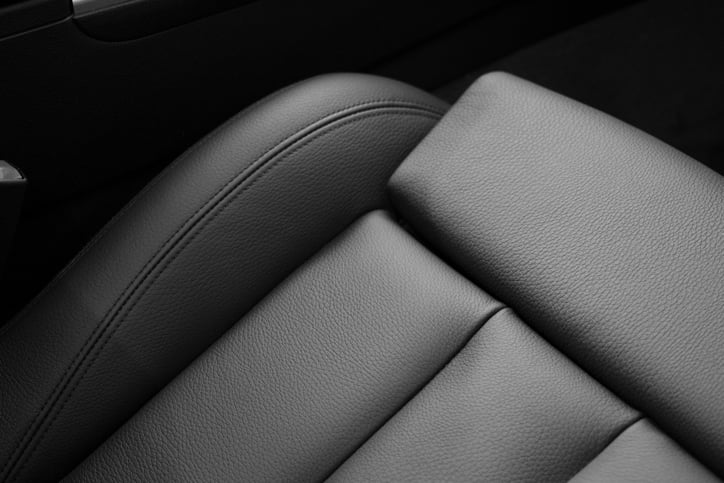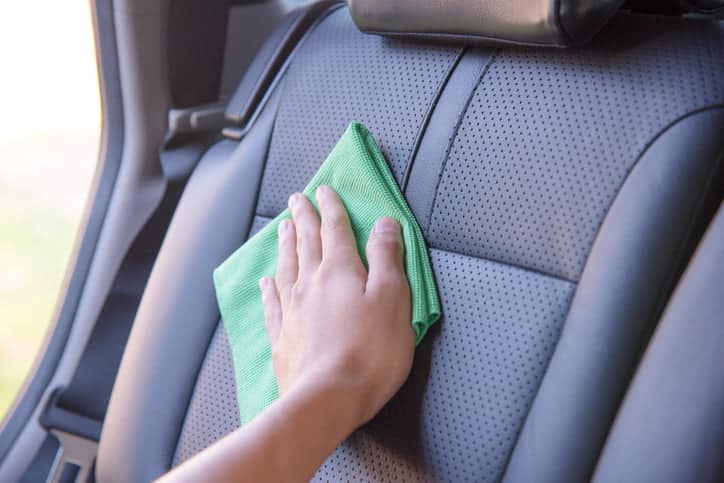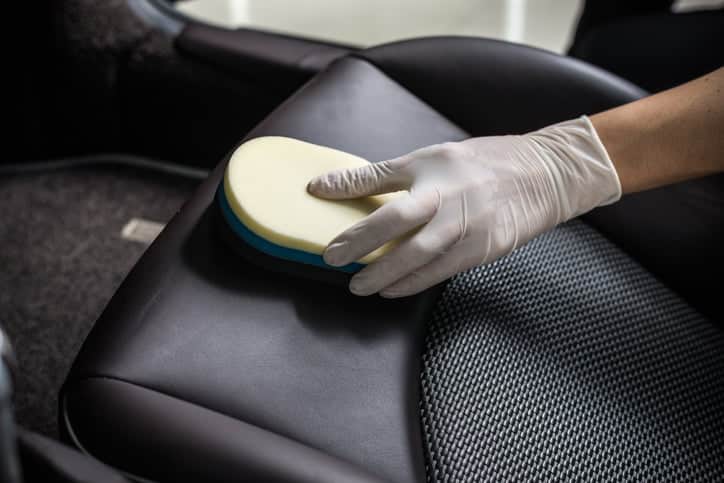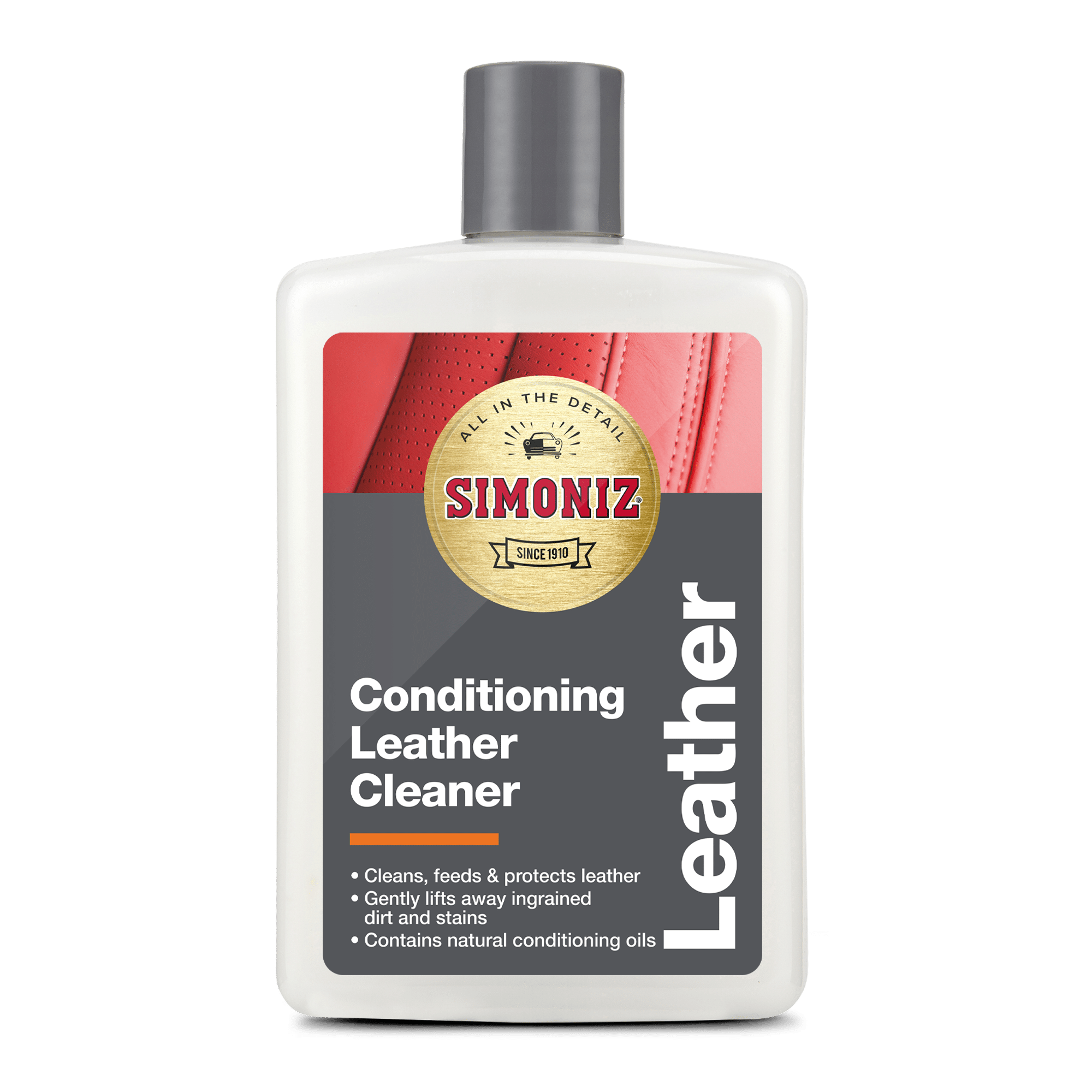Leather car seats are a must-have for many motorists. They’re comfortable, durable, smell great, and feel a little more luxurious than upholstered seats. They can also help a car’s resale value when it’s trade-in time – but only if they’ve been kept in great condition.

While they are durable, hardwearing and easy to clean, leather seats do need some special care and attention to keep them looking their best. Leather can start to look tired after a lot of daily wear and tear, so it’s good to know how to get your seats shining like new.
By using a few specialist products from Simoniz, you can easily keep your leather seats looking factory-fresh for years to come.
In this guide, we show you how to take care of leather like a pro, with advice on cleaning, conditioning and repairing your car’s leather-trimmed interior.
- How to clean leather car seats
- How to condition leather car seats
- How to remove stains from leather car seats
- How to repair a tear or crack in leather seats
- How to keep leather car seats in good shape
How to clean leather car seats
Keeping leather car seats clean and conditioned is straightforward enough, but if you’re not sure how to approach it and what sort of products to use, our step-by-step guide can help.

You’ll need:
- Vacuum cleaner
- Simoniz Leather Cream – this 2-in-1 product cleans and conditions leather, with natural oils providing great protection and shine
- Two soft applicator cloths
Step 1
Vacuum the seats with a soft brush head attachment, so as not to scratch the leather. Remove as much dirt and dust as you can to make cleaning the seats easier.
Step 2
Using Simoniz Leather Cream, apply a small amount to a cloth and wipe the seats down to remove surface dirt. Don’t scrub hard; instead, use a circular motion to massage and agitate the leather fibres.
Step 3
Once you’ve applied the product, the leather may look dull, but this is normal. Leave it to work for a few minutes and then, using a second clean cloth, buff the seats to bring up the leather’s high shine.
Simoniz Top Tip: To keep leather car seats clean on the go, keep a pack of leather cleaning wipes in your glovebox. Products like Simoniz Leather Wipes clean, treat and shine leather, so the seats will stay looking great between full cleans.
How to remove stains from leather car seats
Leather can stain surprisingly easily, and any marks can be difficult to remove. If you’ve got a stubborn stain on your leather car seats, follow the steps below.

You’ll need:
- Simoniz Leather Cream
- Two soft applicator cloths
- Soft-bristled paintbrush
- Scouring pad (this kind)
Step 1
Follow the steps above to clean the seats thoroughly.
Step 2
Apply the Leather Cream directly to the stain; a pea-sized amount should do it. Rub it in slightly with a cloth and leave it to work for five minutes.
Step 3
Use the paintbrush to agitate the stain. A firm, circular motion will really work the product into the leather, helping to lift the mark.
Step 4
If it’s still not budging, grab your scouring pad and lightly rub the affected area. Don’t apply too much pressure as you don’t want to scratch the leather. Rub lightly in the same circular motion, and you should hopefully find that the stain begins to lift without too much effort.
Simoniz Top Tip: After removing a stain and cleaning the seats, it’s important to re-condition them. Any scrubbing will have removed the protective coating and diminished the shine, so apply a good amount of Simoniz Leather Cream to the area, leave it to work for a few minutes, and then buff off to a high shine.
How to condition leather car seats
Conditioning is the process of restoring moisture and natural oils to leather so that they can continue to look in the best condition for as long as possible.
You’ll be glad to know that Simoniz Leather Cream acts as a cleaner as well as a conditioner, meaning that you can use just one product rather than having to buy and store multiple bottles. By following the steps above, your leather will be clean and conditioned.
Separate conditioners are available to buy, but they require more time and effort to apply rather than just using one product that can do it all.
Conditioning leather seats can reduce the chance of staining, cracking, and fading colour.
Simoniz Top Tip: Test the leather conditioner on a small spot of leather to make sure that the conditioner won’t cause discolouration.
How to repair a tear or crack in leather car seats
If leather car seats aren’t cleaned and conditioned regularly, they’re at more of a risk of cracking and tearing because the leather dries out and becomes less supple. If your seats have suffered a rip, tear or crack, follow our steps below to repair it.

You’ll need:
- Leather repair kit – complete kits are available, and include leather glue, filler, palette knife, sandpaper and a base colour (make sure you get the same colour as your seats, obviously!)
- Scissors
- Vacuum cleaner
Step 1
Make sure the seats are clean and dry before vacuuming around the edge of the tear or rip. This is to remove loose debris and bits before you start the repair.
Step 2
With a sharp pair of scissors, cut away any ragged edges from around the tear. The repair will only work if you have clean edges, so this is a crucial step.
Step 3
Per the instructions in the repair kit, place the backing material inside the rip and glue it in place with the leather glue. Wait for the glue to dry before moving on to the next step.
Step 4
Fill the space between the ripped edges with leather filler, using a palette knife to spread it evenly on to the backing material. Build up layers of filler by allowing it to dry between applications.
Step 5
Use fine-grain sandpaper to smooth over the top layer of filler. When it’s smooth and even, wipe it down and leave to dry.
Step 6
Use a clean cloth or square of kitchen roll to apply the leather base colour to the filler. You may need to apply it several times to achieve the same depth of colour as the original leather. Leave it to dry fully.
Step 7
Apply the leather sealant per the instructions. This is there to stop the colourant coming off, so it’s an important final step in the process.
Simoniz Top Tip: Only attempt to repair leather car seats if you’re comfortable with the process and have all the right tools. A professional will almost always do a better job, so it just depends on your budget and how hands-on you like to be when maintaining your car.
How to keep leather car seats in good shape
Even though leather is a hardwearing material, it still requires some love and care to keep it in the best condition. Here are Simoniz’s top tips to keep your leather looking brand new for longer.
Clean spills sooner rather than later
Having a regular cleaning and conditioning schedule will help to prolong the life of your leather seats. By cleaning and conditioning every 3-6 months, you’ll keep them supple and looking great.
Repair damage as soon as it happens
We get it, life happens, and damage is going to happen, even with hardwearing materials like leather. If you notice damage to your leather seats, make sure to get it repaired as soon as possible to avoid further issues.
Use seat covers if you know your car interior may get dirty
Sometimes dirt is unavoidable, but if you know that you’re picking the kids up from football or jumping back into the car after a muddy hike, you can avoid some of the mess by fitting seat covers in your car. They range in price from £30 to a couple of hundred pounds.
Be careful with sharp objects such as car keys
Although leather can be repaired, it’s probably best to try and avoid damaging them in the first place. Sharp objects like keys can easily penetrate through leather, leading to costly repairs.
And there you have it – a complete guide to taking care of leather car seats like a pro. For more car care guides and motoring tips, be sure to check out the rest of the Simoniz blog. If you’re keen to find out more about our brilliant range of trusted car care products, visit our product page.

